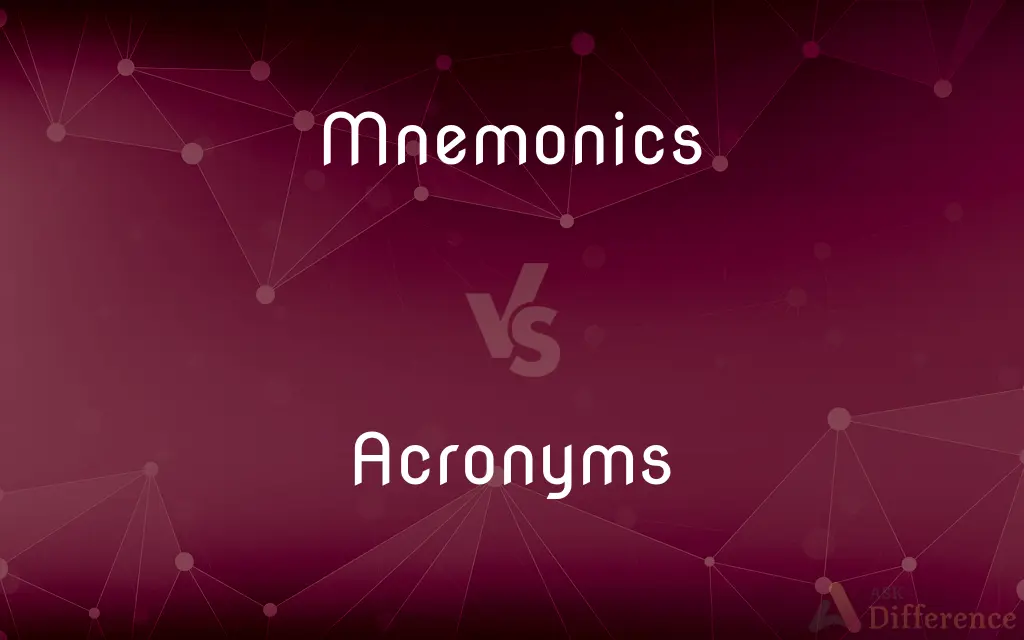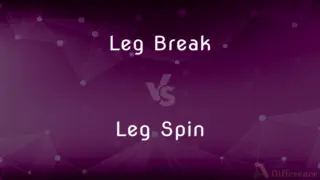Mnemonics vs. Acronyms — What's the Difference?
By Tayyaba Rehman — Published on November 20, 2023
Mnemonics are memory aids, often using patterns; Acronyms form words from initial letters of phrases.

Difference Between Mnemonics and Acronyms
Table of Contents
ADVERTISEMENT
Key Differences
Mnemonics are tools or techniques that individuals use to aid their ability to remember something. These techniques can be patterns of letters, ideas, or associations. For instance, students might use mnemonics to remember complex concepts or sequences in various subjects.
Acronyms, on the other hand, are a type of abbreviation. They are formed by taking the initial letters of a phrase and creating a new word out of those letters. Acronyms are prevalent in both everyday language and specialized fields, serving as a shorthand for longer terms or phrases.
While mnemonics serve to enhance memory and recall, acronyms function primarily to simplify and shorten speech or writing. It's possible, however, for an acronym to act as a mnemonic if the acronym itself helps one remember the phrase it stands for.
In essence, while mnemonics can take various forms and are explicitly designed to assist memory, acronyms are specific types of abbreviations made from the initial letters of words. Both serve to simplify information, but their primary functions and applications differ.
Comparison Chart
Primary Purpose
Aid memory
Abbreviate phrases
ADVERTISEMENT
Formation
Various forms (rhymes, patterns, etc.)
Initial letters of words
Usage Example
"PEMDAS" for order of operations
"NASA" for National Aeronautics and Space Administration
Flexibility
Can be visual, auditory, etc.
Typically textual
Can overlap?
Yes (an acronym can be a mnemonic)
Yes (can serve as a memory aid)
Compare with Definitions
Mnemonics
Mnemonics are tools designed to enhance memory.
Using the mnemonic ROYGBIV helps remember the colors of the rainbow.
Acronyms
Acronyms are abbreviations formed from initial letters.
FBI is the acronym for the Federal Bureau of Investigation.
Mnemonics
Mnemonics can simplify complex information for easy recall.
Medical students use mnemonics to memorize intricate details.
Acronyms
Acronyms often become recognized words in their own right.
Laser started as the acronym for light amplification by stimulated emission of radiation.
Mnemonics
They can take the form of patterns, rhymes, or associations.
The mnemonic Every Good Boy Deserves Fudge aids in recalling musical notes.
Acronyms
They condense longer phrases into shorter forms.
AIDS stands for Acquired Immune Deficiency Syndrome.
Mnemonics
They cater to various learning styles, like auditory or visual.
Visual mnemonics might involve imagining a scene or picture.
Acronyms
They're commonly used in both professional fields and daily language.
BRB is a common acronym meaning be right back in online chats.
Mnemonics
Mnemonics often simplify sequences or lists into memorable phrases.
PEMDAS is a mnemonic to remember the order of operations in math.
Acronyms
Acronyms can simplify speech or written text.
NATO is shorter than saying North Atlantic Treaty Organization.
Mnemonics
A system to develop or improve the memory.
Acronyms
A word formed by combining the initial letters of a multipart name, such as NATO from North Atlantic Treaty Organization or by combining the initial letters or parts of a series of words, such as radar from radio detecting and ranging.
Mnemonics
(plurale tantum) The study of techniques for remembering anything more easily.
Acronyms
Usage Problem An initialism.
Mnemonics
Plural of mnemonic
Acronyms
Plural of acronym
Mnemonics
The art of memory; a method for improving the memory; a system of precepts and rules intended to assist the memory; artificial memory.
Acronyms
Infl of acronym
Mnemonics
A method or system for improving the memory
Common Curiosities
Can acronyms serve as mnemonics?
Yes, if the acronym helps in remembering the phrase it stands for, it can act as a mnemonic.
How do acronyms differ from abbreviations?
Acronyms are specific types of abbreviations formed from the initial letters of words, often pronounced as a new word.
Is "LOL" a mnemonic or an acronym?
"LOL" is an acronym for "laugh out loud."
What is the primary purpose of mnemonics?
Mnemonics are used to aid memory and recall.
Can mnemonics be personalized?
Absolutely! Many people create their own mnemonics tailored to their understanding.
What's a well-known historical mnemonic?
"In 1492, Columbus sailed the ocean blue."
What's the difference between acronyms and initialisms?
Both are formed from initial letters, but acronyms are pronounced as words (like "NATO"), while initialisms are pronounced letter by letter (like "FBI").
Why are mnemonics used in education?
Mnemonics help students remember and retrieve complex information, aiding in learning and examination.
Are mnemonics always verbal?
No, mnemonics can be visual, auditory, or even kinesthetic.
Do mnemonics work for everyone?
Mnemonics are tools, and their effectiveness can vary. What works for one person might not work for another.
Why are acronyms so prevalent in professional fields?
Acronyms simplify and shorten complex terms, making communication more efficient.
Is "NASA" a mnemonic?
"NASA" is primarily an acronym for the National Aeronautics and Space Administration, but it could aid memory for some.
Can visual imagery serve as a mnemonic?
Yes, visual mnemonics use images to represent and recall information.
Are all mnemonics based on words?
No, mnemonics can be patterns, rhymes, songs, images, or any tool that assists memory.
Do all acronyms make phonetic sense?
No, while many acronyms form pronounceable words, others do not and are read by stating each letter.
Share Your Discovery

Previous Comparison
Leg Break vs. Leg Spin
Next Comparison
Phosphodiester Bond vs. Phosphoester BondAuthor Spotlight
Written by
Tayyaba RehmanTayyaba Rehman is a distinguished writer, currently serving as a primary contributor to askdifference.com. As a researcher in semantics and etymology, Tayyaba's passion for the complexity of languages and their distinctions has found a perfect home on the platform. Tayyaba delves into the intricacies of language, distinguishing between commonly confused words and phrases, thereby providing clarity for readers worldwide.













































